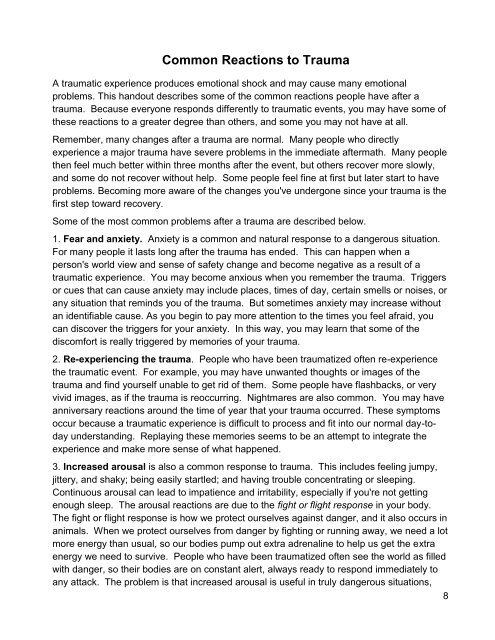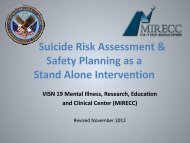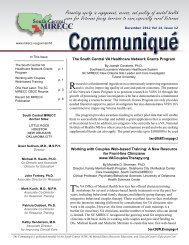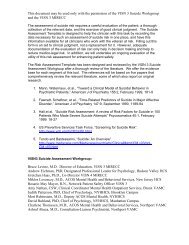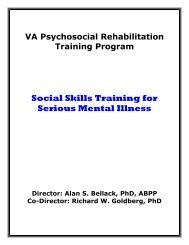PTSD Recovery Group-Client Manual
PTSD Recovery Group-Client Manual
PTSD Recovery Group-Client Manual
Create successful ePaper yourself
Turn your PDF publications into a flip-book with our unique Google optimized e-Paper software.
Common Reactions to Trauma<br />
A traumatic experience produces emotional shock and may cause many emotional<br />
problems. This handout describes some of the common reactions people have after a<br />
trauma. Because everyone responds differently to traumatic events, you may have some of<br />
these reactions to a greater degree than others, and some you may not have at all.<br />
Remember, many changes after a trauma are normal. Many people who directly<br />
experience a major trauma have severe problems in the immediate aftermath. Many people<br />
then feel much better within three months after the event, but others recover more slowly,<br />
and some do not recover without help. Some people feel fine at first but later start to have<br />
problems. Becoming more aware of the changes you've undergone since your trauma is the<br />
first step toward recovery.<br />
Some of the most common problems after a trauma are described below.<br />
1. Fear and anxiety. Anxiety is a common and natural response to a dangerous situation.<br />
For many people it lasts long after the trauma has ended. This can happen when a<br />
person's world view and sense of safety change and become negative as a result of a<br />
traumatic experience. You may become anxious when you remember the trauma. Triggers<br />
or cues that can cause anxiety may include places, times of day, certain smells or noises, or<br />
any situation that reminds you of the trauma. But sometimes anxiety may increase without<br />
an identifiable cause. As you begin to pay more attention to the times you feel afraid, you<br />
can discover the triggers for your anxiety. In this way, you may learn that some of the<br />
discomfort is really triggered by memories of your trauma.<br />
2. Re-experiencing the trauma. People who have been traumatized often re-experience<br />
the traumatic event. For example, you may have unwanted thoughts or images of the<br />
trauma and find yourself unable to get rid of them. Some people have flashbacks, or very<br />
vivid images, as if the trauma is reoccurring. Nightmares are also common. You may have<br />
anniversary reactions around the time of year that your trauma occurred. These symptoms<br />
occur because a traumatic experience is difficult to process and fit into our normal day-today<br />
understanding. Replaying these memories seems to be an attempt to integrate the<br />
experience and make more sense of what happened.<br />
3. Increased arousal is also a common response to trauma. This includes feeling jumpy,<br />
jittery, and shaky; being easily startled; and having trouble concentrating or sleeping.<br />
Continuous arousal can lead to impatience and irritability, especially if you're not getting<br />
enough sleep. The arousal reactions are due to the fight or flight response in your body.<br />
The fight or flight response is how we protect ourselves against danger, and it also occurs in<br />
animals. When we protect ourselves from danger by fighting or running away, we need a lot<br />
more energy than usual, so our bodies pump out extra adrenaline to help us get the extra<br />
energy we need to survive. People who have been traumatized often see the world as filled<br />
with danger, so their bodies are on constant alert, always ready to respond immediately to<br />
any attack. The problem is that increased arousal is useful in truly dangerous situations,<br />
8


